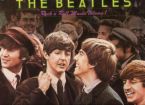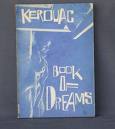 The Ghost of the Susquehanna
The Ghost of the SusquehannaSo I am re-reading On the Road for the third time, like I mentioned, and this time I caught something that I missed before. I have the benefit this time around of knowing more about the history of this most famous of the Kerouac novels that I was not aware of before, and also having read other Kerouac books in the meantime.
One of the reasons On the Road brought Kerouac so much fame, at least in the literary circles, was due to this legend that the book was written in three weeks time. Kerouac had tape
 d together several sheets of paper so that the paper could run continuously into his typewriter (keep in mind this was the 1950s, before the advent of personal computers), and in a benzedrine fueled craze, simply typed and typed the story of the three cross country trips he made with Neal Cassady "as if he was telling a story to a friend", which became his trademark "voice". That original manuscript, with true names and adventures intact, was rolled into a scroll and is still around today, and will be visiting Austin soon as part of the "On the Road with the Beats" traveling exhibit, which I plan to visit in the upcoming months.
d together several sheets of paper so that the paper could run continuously into his typewriter (keep in mind this was the 1950s, before the advent of personal computers), and in a benzedrine fueled craze, simply typed and typed the story of the three cross country trips he made with Neal Cassady "as if he was telling a story to a friend", which became his trademark "voice". That original manuscript, with true names and adventures intact, was rolled into a scroll and is still around today, and will be visiting Austin soon as part of the "On the Road with the Beats" traveling exhibit, which I plan to visit in the upcoming months.After two years of revision by his publishers (including changing the names and certain situational details), the book was finally published in 1957. His adventures on the road with Cassady, however, had began in 1947, when he was in the middle of completing The Town and The City, his first published novel. In the span of those ten years, Kerouac had tried to write the story of his adventures with Cassady several different ways. He experimented with voice and character, struggling to figure out how to convey to his future audiences his experiences.
One of those attempts was published as a novella under the name of Pic after Kerouac's death, released by his estate. It tells the story of a young black child on the road with his uncle, originatin
 g on North Carolina backwoods through to New York City and then on to California. It is told with the vernacular that would be possessed by this type of person during this time period, and is written as if the child is telling the story of the journey to his grandfather. I read Pic sometime in the last year and found it unremarkable except for the pertinence to the development of Kerouac as a writer.
g on North Carolina backwoods through to New York City and then on to California. It is told with the vernacular that would be possessed by this type of person during this time period, and is written as if the child is telling the story of the journey to his grandfather. I read Pic sometime in the last year and found it unremarkable except for the pertinence to the development of Kerouac as a writer.Last night when I was reading On the Road, though, I came to a part in the novel that sounded familiar, and knew exactly where I had heard it before. It is the story of "The Ghost of the Susquehanna", which sounds ominuous and thrilling but is simply a story of an unusual man that Kerouac encountered on his journey.
From On the Road:
It was the night of the Ghost of the Susquehanna. The Ghost was a shriveled little old man with a paper satchel who claimed he was headed for "Canady". He walked very fast, commanding me to follow, and said there was a bridge up ahead we could cross. He was about sixty years old; he talked incessantly of the meals he had had, how much butter they gave him for pancakes, how many extra slices of bread, how the old men had called to him from a porch of a charity home in Maryland and invited him to stay for the wekeend, how he took a nice warm bath before he left; how he found a brand-new hat by the side of the road in Virginia and that was it on his head, how he hit every Red Cross in town and showed them his World War I credentials; how the Harrisburg Red Cross was not worthy of the name; how he managed in this hard world. But as far as I could see he was just a semi-respectable walking hobo of some kind who covered the entire Eastern Wilderness on foot, hitting Red Cross offices and sometimes bumming on Main Street corners for a dime. We were bums together. We walked seven miles along the mournful Susquehanna.
In the novella Pic, the main character and his uncle walk these seven miles with this man, and the child describes how hungry his conversation made him, and some of the silly things the man was doing, such as looking through his paper satchel for a tie that might not have existed at all. In both stories, the walk ended with the realization that the man was headed the wrong way, and that those seven miles were a complete waste of time and energy.
This is where we leave this character in On the Road:
It began to rain hard. A man gave me a ride back to Harrisburg and told me I was on the wrong road. I suddenly saw the little hobo standing under a sad streetlamp with his thumb stuck out- poor forlorn man, poor little lost sometimeboy, now broken ghost for the penniless wilds. I told my driver the story and he stopped to tell the old man.
"Look here fella, you're on your way west, not east."
"Heh?" said the little ghost. "Can't tell me I don't know my way around here. been walking this country for years. I'm headed to Canady."
"But this ain't the road to Canada, this is the road to Pittsburgh and Chicago." The little man got disgusted with us and walked off. The last I saw of him was his bobbing little white bag dissolving in the darkness of the mournful Alleghenies.
In Pic, there is a whole chapter devoted to the story of this little man. What I thought was possibly an inside joke for Kerouac was this first line here, from Pic, and here is also where the characters in this story leave the man:
"Heh heh. I just misjudged you boys like I misjudged that young man thee years ago, that's all I done. I'm ready to go on if you ain't."
"Well, we can't walk all night," Slim said.
"Go ahead, give up. I'm all set to walk up to Canady and straight on through New York City if that's how the chips fall."
"New York City?" Slim yelled. "Did I hear you say? Ain't this the road west to Pittsburgh?"
Slim stopped, but the man hurried right along. "Say, did you hear me?"Slim yelled. That old man heard him all right but didn't care. "Keep walking," I say. "Maybe I'll be in Canady, maybe I won't. Can't wait around all night." And he kept talkin, and walkin, till all we could see was his shadow fadin in the dark and gone like a ghost.
What I find interesting about this is two fold: how it relates to what I enjoy about Kerouac and how it relates to our common experience.
To me, reading the "Dulouz Legend" (Kerouac's pet name for his library of published works) is a bit like being a detective. There are clues to what he is talking about if you read carefully, like for instance which of his famous friends is a character in the story (since they went by many pseudonyms in his books) and which experience of his is he drawing inspiration from. I liked comparing these two books side by side, the same experience written two completely different ways with different results on the reader. It was enjoyable for me to read this part and recognize it from another book.
It also makes you think of wher
 e you might have been in the same situation before, or felt the same way, and what is he saying about humanity through his individual experience.
e you might have been in the same situation before, or felt the same way, and what is he saying about humanity through his individual experience.For instance, have you ever followed someone "down a road" and found out later they had no idea what they were talking about, and felt silly for wasting the energy to go down that "road" with a person? Also, is a misperception something that makes us kinda crazy, or something we all have to deal with from time to time? You could make a case that the little ghost man was mentally ill, but perhaps he was simply misguided, simply stuck on an idea that makes no sense to anyone but him. Don't we all do this from time to time, become convinced that we are on the right path when it is clear to others around us, or is pointed out, that it might not be the way to go? And when the truth is pointed out, do we hold tight to our convictions, like the little hobo, and go off anyway to do what we are planning to do, or do we turn around, like our main characters, and find the right road?


























1 comment:
Hey thanks. I reread the first chapter of 'Dharma Bums' last night and the bit about the little hobo with the St. Theresa prayer got me thinking about the Ghost of the Susquehanna. I was thinking he was mentioned in more than one book, so did a google search this morning and found your piece. Very nice.
Post a Comment